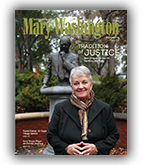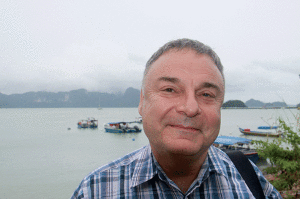A portrait of Nelson Mandela hung in the office of Associate Professor of Geography Donald Rallis most of his 23 years at Mary Washington. The South African leader personified the anti-apartheid movement, and many professors and students saw him as a symbol of freedom and justice. But Rallis’ choice to so honor Mandela revealed aspects of Rallis’ character and accomplishments that deserve notice on his retirement from UMW.
In 1990, Rallis arrived at Mary Washington College – a smaller, quieter, and less diverse institution than UMW is today. He created courses in third world development and world cities, and he encouraged students to open up to the diversity of the world. He taught that overcoming injustice required perseverance and knowledge – and his students learned that geography provides an approach to obtaining that knowledge.
American University Associate Professor of Geography Carole Gallaher ’91 took courses in urban and economic geography with Rallis his first year at Mary Washington. “Donald probably doesn’t know it, but he is the reason I went to grad school,” she said. “He opened my eyes to … geography as a way of doing research.”
In the early ’90s, momentous changes occurred in South Africa. Mandela was freed, and after a few years was elected president of the post-apartheid state. Rallis quickly organized a study-abroad program so that students could experience these changes.
Patty Mims ’92 participated in the first of those programs. “The cultural and geographic experiences we had in South Africa enlightened me to hope, struggles for equality, and the ability of people to always make the best of every situation,” she said. Today she works for ESRI, a supplier of GIS software, Web GIS, and geodatabase management applications.
“He opened my eyes to …geography as a way of doing research.” – Carole Gallaher ’91
A few years later, in the Johannesburg suburb of Houghton, Rallis and his students passed by Mandela as he took his morning walk. The leader stopped to shake hands with every member of the group, providing Mary Washington students with once-in-a-lifetime memories.
Rallis’ pursuit of social justice has profoundly affected Mary Washington. In South Africa and as a graduate student in the United States, Rallis had been open about being gay. Upon his arrival at Mary Washington, however, friends cautioned him against making this identity known. But when then-President Bill Clinton established the infamous “don’t ask, don’t tell” policy for the armed services, Rallis was compelled to speak out.
“I am gay and I am angry,” he wrote in a 1993 op-ed in The Bullet, which led to a campus forum on homosexuality.
Frostburg State University Assistant Professor of Geography Richard Russo ’93 and others who attended the forum – a debate between Rallis and another professor – cite Rallis’ public courage as giving them the strength to embrace their own identities and to stand proud as gay people. UMW Professor of History Jeffery McClurken ’94 said fellow students reconsidered their own homophobia in the wake of the event. He credits Rallis with moving UMW toward welcoming LGBT students.
Rallis created field programs in South Africa, Cambodia, and Australia and New Zealand. His ability to draw insights about culture from even the most mundane landscapes inspired students to explore the world and become geographers, no matter their major. He integrated Web-based technologies into his classes in the 1990s and continues to use technology to take students into the world and to bring the world to their classrooms.
Rallis has joined the faculty of the American University of Phnom Penh, and we hope he will continue to inspire Mary Washington students by teaching online classes and, perhaps, by leading field programs in Cambodia.
The University of Mary Washington wishes him every success.

